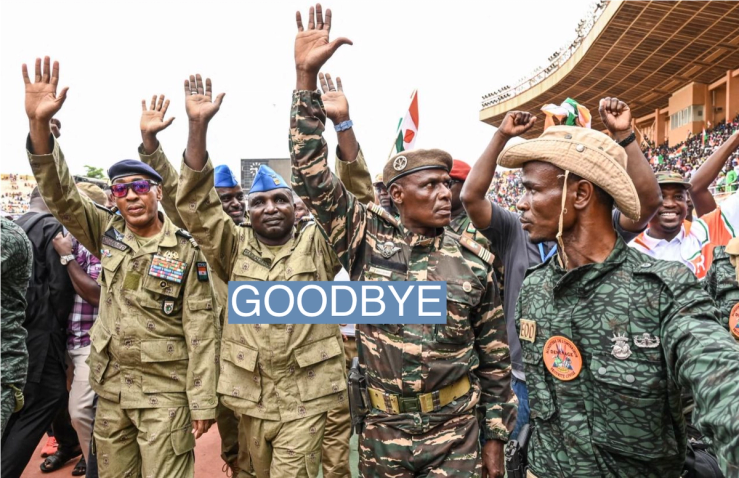The Facts
Niger’s junta ended an agreement that allows U.S. military and civilian staff to operate on its soil.
The move was announced on Saturday in a televised address by junta spokesman Amadou Abdramane.
The U.S. used a drone base in Niger to monitor jihadist groups linked to Al Qaeda and Islamic State that operate in the Sahel. Militants have destabilized the subregion through attacks that have killed thousands and forced millions to flee their homes.
In this article:
Know More
→ Why now? The announcement by the junta, which seized power in a coup last July, followed a visit days earlier by U.S. officials to discuss security and governance issues. Abdramane suggested the American delegation raised objections about the junta’s choice of military allies. He also criticized what he called their “condescending attitude.”
→ And the U.S. response? The Pentagon remains “in contact” with the junta, a spokesperson said on Monday, adding: “We want to see our partnership continue if there is a pathway forward.” The spokesperson said talks with the junta were partly spurred by concerns over the country’s potential relationships with Russia and Iran. “We were troubled on the path that Niger is on,” the spokesperson said.
→ How big was the U.S. presence? The U.S. runs two bases in Niger to carry out manned and unmanned flights. It has invested about $100 million in its drone base, located in the central city of Agadez, which is known as airbase 201.
There were around 1,100 U.S. troops in Niger last year but that number has shrunk in the wake of the coup to about 650 now.
Alexis’s view
This is about Russia and its deepening ties with Niger. The junta in Niamey kicked out French troops late last year. It has turned to Russia for military assistance in recent months, as have Mali and Burkina Faso.
The claim that the U.S. team adopted a “condescending attitude” is part of a broader pushback against Western powers who military rulers in the region say want to control African governments and benefit from their resources while not doing enough to fight jihadist insurgents. That sentiment is understandable when applied to Western powers in general. For example, Niger has some of the world’s largest deposits of uranium which France extracted for years to run its nuclear power plants. Other Western countries also have deep business and economic interests in West Africa.
With insurgents killing thousands and forcing millions to flee their homes in parts of the subregion — most notably in Niger, Mali, Burkina Faso and northern Nigeria — it is not surprising that there would be a move to try something new, particularly if there is a sense that the West is benefiting without improving the security situation.
Unfortunately, the various moves by Niger, Mali and Burkina Faso seem likely to prompt a deterioration in the security situation. By pushing to leave Ecowas, following their suspension from the regional bloc, they are isolated and lack the support of shared intelligence that help to tackle transnational security threats. And that deficiency will only deepen with the departure of the U.S. and its drone capabilities.
Data from the Armed Conflict Location & Event Data Project (ACLED), a U.S.-based crisis-monitoring group, suggests the security situation in the Sahel has been getting worse since the ascent of military governments in Mali, Burkina Faso and Niger — a trio that have cemented their ties in a military cooperation pact. ACLED’s research suggests that the number of people killed by acts of political violence in Burkina Faso in 2023 was double that of the previous year, with more than 8,000 people killed.
Niger’s decision to cut out the U.S. adds to a growing sense of uncertainty over how militants in the Sahel will be fought. Niger, Mali and Burkina Faso have put their faith in Russia to provide military assistance. But its worth remembering that Moscow’s military priorities are directed towards one goal: winning the war in Ukraine. That means any resources provided to assist in the Sahel will be afterthought. The future course of the war in Ukraine is unknown and the rebranding of Wagner after the death of its leader Yevgeny Prigozhin last year is a work of progress, which also adds to the uncertainty.
Notable
- Burkina Faso has become the “laboratory of the post-Prigozhin Russian presence” in Africa, a security analyst tells Al Jazeera. He argues that Moscow’s attempts to strengthen ties on the continent have evolved since the death of the Wagner leader in a plane crash last year.


